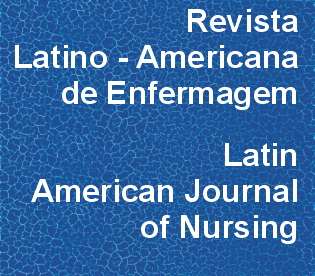Estresse ocupacional e autoavaliação de saúde entre profissionais de enfermagem
DOI:
https://doi.org/10.1590/S0104-11692013000200002Resumo
OBJETIVO: analisar a associação do estresse no trabalho com a autoavaliação da saúde entre os trabalhadores de enfermagem, nas unidades de emergências de hospitais públicos. MÉTODOS: trata-se de estudo seccional com aplicação de questionário autopreenchido em uma amostra de 134 profissionais, utilizando-se a versão resumida do Job Stress Scale. Foram realizadas análises descritivas das características sociodemográficas, de saúde e relacionadas ao trabalho, e análise multivariada, por meio de regressão logística não condicional para ajuste da associação entre estresse no trabalho e autoavaliação de saúde negativa, segundo potenciais variáveis de confusão, com nível de significância de 5%. RESULTADOS: setenta por cento dos entrevistados foram classificados como trabalhadores passivos ou com alto desgaste. A autoavaliação de saúde negativa foi significativamente maior entre os profissionais com alta demanda e baixo controle, quando comparada com aqueles com baixo desgaste, após ajuste para covariáveis. CONCLUSÕES: o baixo controle, aliado à baixa demanda, pode servir como fator desestimulador, contribuindo para o aumento da insatisfação profissional. Recomenda-se que as instituições adotem uma política de planejamento e gerenciamento de recursos humanos com estímulo à participação dos profissionais nas decisões, visando redução do estresse no trabalho entre os trabalhadores de enfermagem.Downloads
Os dados de download ainda não estão disponíveis.
Downloads
Publicado
2013-04-01
Edição
Seção
Artigos Originais
Licença
Os direitos autorais são de propriedade exclusiva da revista, transferidos por meio da Declaração de Transferência de Direitos Autorais (presente no Formulário Individual de Declarações) assinada pelos autores. Para a utilização dos artigos, a RLAE adota a Licença Creative Commons, CC BY-NC Atribuição não comercial (resumo ou código completo da licença). Com essa licença é permitido acessar, baixar (download), copiar, imprimir, compartilhar, reutilizar e distribuir os artigos, desde que para uso não comercial e com a citação da fonte, conferindo os devidos créditos autorais a Revista Latino-Americana de Enfermagem. Nesses casos, nenhuma permissão é necessária por parte dos autores ou dos editores.Como Citar
Theme Filha, M. M., Costa, M. A. de S., & Guilam, M. C. R. (2013). Estresse ocupacional e autoavaliação de saúde entre profissionais de enfermagem . Revista Latino-Americana De Enfermagem, 21(2), 475-483. https://doi.org/10.1590/S0104-11692013000200002



